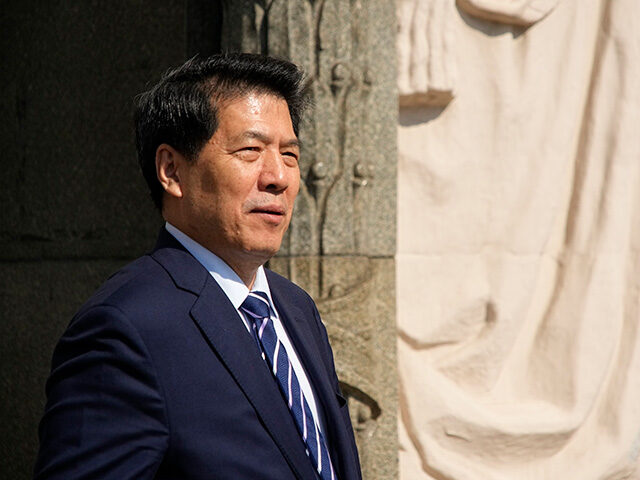The Chinese Communist Party announced Wednesday that it would send its top diplomat on Russia, “Special Representative of the Chinese Government on Eurasian Affairs Li Hui,” on a tour of Russia, Ukraine, and relevant European actors to discuss Moscow’s ongoing invasion.
Li will begin his “shuttle diplomacy” tour on Saturday, the Chinese Foreign Ministry announced, and travel to “Russia, the EU headquarters, Poland, Ukraine, Germany and France” in pursuit of “a political settlement of the Ukraine crisis.”
Explaining the rationale for the visit, Foreign Ministry spokeswoman Mao Ning told reporters during her regular briefing on Wednesday that China has been “playing a constructive role” in the Ukraine war and that Beijing hopes “to build consensus for ending the conflict and pave the way for peace talks.”
The tour will be Li’s second after making stops in Russia, Ukraine, Poland, France, and Germany in May 2023. Li, a former Chinese ambassador to Russia, engaged in conversations with senior leaders in all countries at the time to promote China’s alleged “peace” plan for Ukraine and Russia, which largely consists of vague demands for both belligerent parties to “calm down as soon as possible.” The first Chinese intervention did not result in any noticeable changes in the situation on the ground in Ukraine.
“The protraction of the Ukraine crisis does not serve the common interest of the international community,” Chinese Foreign Ministry spokeswoman Mao Ning told reporters on Thursday, addressing the imminent visit by a Chinese delegation to Russia and Ukraine. “China stands ready to continue to play its role and contribute China’s wisdom to seeking a political settlement of the Ukraine crisis.”
The first “shuttle diplomacy” trip in May was the result of a phone conversation between genocidal Chinese dictator Xi Jinping and Zelensky in April 2023, which occurred after months of Zelensky publicly pleading for an audience of some sort with the tyrant.
“I believe that this call, as well as the appointment of Ukraine’s ambassador to China, will give a powerful impetus to the development of our bilateral relations,” Zelensky said of his conversation with Xi at the time.
The Chinese foray into peacemaking in Ukraine yielded no material results. Li met with Zelensky and top officials in Kyiv in May and reportedly urged Kyiv to try to “build up trust” with Russia, which had launched a “special operation” to eradicate the Ukrainian government convened at the meeting.
“Special Representative Li Hui laid out China’s position and proposals on the political settlement of the Ukraine crisis,” Chinese Foreign Ministry spokesman Wang Wenbin said at the time. “He noted that the four principles, joint efforts in four areas and three observations proposed by President Xi Jinping are China’s fundamental approach to the political settlement of the crisis.”
“There is no panacea for defusing the crisis. All parties need to do their part to build up trust and create conditions for ceasefire and peace talks,” Wang added.
Reports surfaced after Li’s trip to Ukraine that he had attempted, on behalf of the Chinese government, to convince the Ukrainian government to expand economic ties with China at America’s expense and to convince the Ukrainians to allow Russia to keep the regions of Ukraine that it currently controlled as a result of the war and previous forays into the country, such as the 2014 “annexation” of the Crimean peninsula.
Ukrainian Foreign Minister Dmytro Kuleba enthusiastically denied the reports, insisting that angry Ukrainians “keep a cool head and use [their] common sense” about the Chinese reports.
“I immediately contacted my colleagues in the capitals that he visited,” Kuleba said in a video posted to Facebook. “None of them confirmed that any negotiations were held about recognizing the Ukrainian territories where Russia stay[s] now [as Russian].”
China is one of Russia’s closest allies and patrons, relying heavily on Russian oil and gas to meet domestic demand. As two of the five permanent members of the United Nations Security Council, Beijing and Moscow often leverage their power to support each other against the torrent of evidence that both commit gross human rights abuses against their people and those of their neighboring states.
Beijing is in a rare position regarding Russia’s invasion of Ukraine in that it is also a close economic partner to Ukraine and maintains friendly relations with the administration of President Volodymyr Zelensky. Ukraine is a member of China’s predatory Belt and Road Initiative (BRI), which China uses to manipulate vulnerable countries by offering onerous loans meant to be used to pay China to build expensive infrastructure projects. Zelensky has openly invited “Chinese businesses” to help rebuild what remains of Ukraine when the Russian invasion ends.
China has escalated its overt support for Russia in recent months, however, as the full-scale invasion marks its second anniversary and the broader conflict between Russia and Ukraine in the disputed Donbass region approaches a decade in vigor. China’s recently appointed Defense Minister Dong Jun declared in a meeting with his Russian counterpart Sergey Shoigu this month that China “supported you on the Ukrainian issue,” meaning the Russian government, “despite the fact that the US and the EU continue to put pressure on the Chinese side.”
Dong vowed that Beijing “will not change or abandon [its] established policy course over this.”

COMMENTS
Please let us know if you're having issues with commenting.